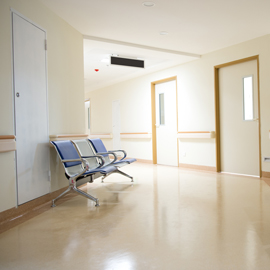
In most cases, you’ll be admitted to the hospital either the night before or early in the morning on the day of your surgery. Most gastric sleeve patients are discharged the day after surgery, so you’ll need to go through the hospital’s admission process. This is typically a fairly quick process on the day of your surgery, as most of your paperwork and insurance information will have been taken care of ahead of time.
While the procedure itself only takes about an hour to complete, you can expect to be in the operating room for two to three hours. You’ll be placed under general anesthesia, which means you’ll essentially be asleep during your operation. During this time, your surgeon will make a few small “keyhole” incisions in your abdominal wall and secure ports in them to make room for long, thin surgical instruments. A narrow camera will be passed through one of these ports so that the surgeon can view the operative site on a nearby video monitor. During your operation, the adjustable gastric band will be fitted around the top portion of your stomach and the access port will be secured beneath the skin in your abdomen. Your band will probably not be filled with fluid during this surgery.
After surgery, you’ll be moved to a recovery room for a few hours. As the anesthesia wears off, you may feel a little pain or discomfort. You should be able to resolve this pain with mild pain relievers. As soon as possible, the hospital staff will help you get out of bed and move around. Walking shortly after surgery helps prevent blood clots, respiratory problems, and bedsores.
In most cases, you’ll be discharged from the hospital later the same day of your surgery or first thing the next morning. You may need to stay in the hospital longer if there were any complications during surgery or if your surgeon had to change to an “open” surgery instead of a laparoscopic procedure.
Remember that you will not generally be allowed to drive yourself home after surgery. Make arrangements ahead of time to have a friend or family member available to take you home. You’ll also want to have loose-fitting clothes, especially pants, available to wear home after your surgery and a small pillow that you can place between your stomach and the seat belt on the drive home.
The day after surgery, you’ll likely have an X-ray taken so that the surgeon can be sure that the band is properly in place. You may be asked to drink a barium liquid before the X-ray so that your esophagus and stomach can be seen.
Frequently Asked Questions After Bariatric Surgery
One of the greatest advantages of laparoscopic gastric banding is the short recovery time. While this doesn’t mean you’ll feel ready to hop out of bed and run a marathon right after your procedure, you’ll likely find that you start feeling better within a couple of days. Here are some things you can expect immediately following your procedure:
When Can I Drink Liquid?
Once you’ve awoken from the anesthesia, you’ll be able to start drinking fluids, including water, tea, and coffee. Once you’re able to take in liquid without difficulty, the IV drip that was providing you with fluids will be removed. In most cases, the IV is removed within an hour of the procedure. At this point, you’ll most likely also be encouraged to get out of bed and take a brief walk.
When Can I Go Home?
Depending on where you have your surgery, you may be released within 2 to 3 hours of your procedure, or you might be kept overnight. In some cases, you may need to have an x-ray before you leave to ensure that the band is in the proper place. You’ll be asked to swallow a small amount of barium liquid during the x-ray so the radiologist can make sure that liquid passes through your band properly. This x-ray will also be helpful in determining the cause of any future problems you may have with your gastric band.
Before you’re released, Dr. Bagnato and/or nursing staff will talk with you about what’s required for your post-surgery diet and answer any questions you may have. This is also when you’ll schedule follow-up appointments and receive contact information in the event that questions should arise later on.
When Can I Go to Work?
For the first few weeks following your surgery, you may not feel quite like yourself. You may find that you’re more tired at the end of the day, and you may find it difficult to follow your post-surgery diet at first (especially during the first phases).
Regardless, you should feel appreciably better after a couple of weeks. You will usually find that you can return to light work within a few days after surgery.
If you have a physically demanding job, you may need two to three weeks to fully recover before you can return to your regular duties.
By day 3 or 4, you should be able to safely return to driving, as long as you’re not taking any prescription pain medications. During your recovery, make sure to try to get up and move around as much as possible in order to make your recovery go as smoothly as possible.


